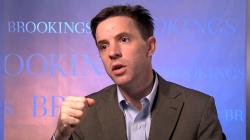

1:00 pm EDT - 2:30 pm EDT
Past Event
1:00 pm - 2:30 pm EDT
1775 Massachusetts Avenue, NW
Washington, DC
20036
On September 28, 2010, the Center on the United States and Europe at Brookings hosted Catherine Ashton, the European Union High Representative for Foreign Affairs and Security Policy, for a roundtable discussion on U.S.-European affairs with a small group of transatlantic policy experts.
Less than a year has passed since Lady Ashton assumed her newly-created leadership position. In spite of formidable challenges, she has already established an impressive track record of accomplishment, including laying the foundations for the new European External Action Service (EEAS) and effectively negotiating with partners from Washington and Beijing to Belgrade. The roundtable conversation, which was part of the ongoing Brookings-Heinrich Boell Foundation Series on the Future of the EU, was a candid and unique opportunity to engage the European Union High Representative on the challenges of her agenda. Brookings President Strobe Talbott provided introductory remarks and moderated the discussion.
The event discussion centered on the role of Europe in the world following the adoption and implementation of the Lisbon Treaty. In particular, much attention was given to the contribution of the member states, the EU institutions and the newly-created EEAS in effectively creating security and stability across Europe and the world. During the discussion, the collected group of experts acknowledged that there was much potential for Europe to address contemporary security challenges, ranging from the terrorist threat posed by Al Qaeda and other radical extremists, to the war in Afghanistan, Iran’s efforts to develop nuclear weapons, recent floods in Pakistan, and piracy activity off the coast of Somalia.
Furthermore, Catherine Ashton and the participants explored the challenges and requirements necessary for Europe to assume an enhanced role of global engagement, including how best to coordinate and collaborate with other important international actors such as the U.S. and NATO, and how to forge effective and strategic partnerships with emerging powers like China. Finally yet importantly, questions relating to the EU’s relations with its immediate neighborhood were considered. While acknowledging the importance for Europe to step up its role in addressing global challenges, it was also emphasized that Europe must remain committed to an active engagement in its neighboring regions, including constructive diplomacy in the Middle East peace process; fostering stability and democracy in the Western Balkans, Black Sea, and Caucasus; and furthering progress in the EU candidacy of Turkey.
Click on any thumbnail below to view a full-size image


Elaine Kamarck
February 26, 2026

William A. Galston, Elaine Kamarck
February 25, 2026

E.J. Dionne, Jr., Wendy Edelberg, Molly E. Reynolds, Melanie W. Sisson
February 12, 2026